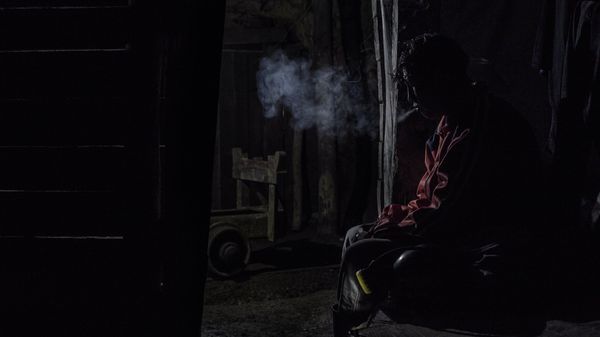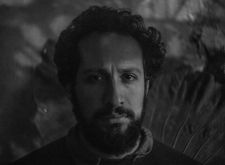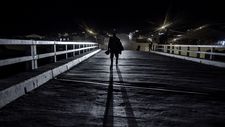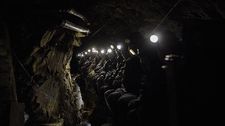 |
| Julio Cezar Ticona as Elder in Dark Skull. Kiro Russo: "I know that I took a lot of risks because people told me, 'I don't like the movie because I don't like the character'.. But that's the reality' |
Russo, who was born in La Paz, says attending film festivals was very important for him as they gave him the confidence to take his more experimental ideas forward. His entry to them came from his time studying at the Universidad del Cine in Buenos Aires.
“The university is very big and it’s a university only for cinema, so it’s very competitive,” Russo tells me when we catch up over Skype.
 |
| Kiro Russo: 'The formulas that are around for 95 per cent of features are, for me, a little bit boring' Photo: Courtesy of San Sebastian Film Festival |
Among the places where he first forged connections was San Sebastian Film Festival in Spain, where he attended the International Film Students Meeting in 2015 with his short documentary New Life (Nueva Vida), which went on to win First Prize.
He says: “Encountering the other students in San Sebastian was, for me, one of the best experiences related to the short films, for two reasons. First, making short films is, for most people, helping the filmmakers prepare for their first feature film and help them take the first steps in their career.
“For me, it's not like that, I really like short films, in fact I'm finishing another one right now. But what I specifically liked about the encounters with students in San Sebastian is that it is for the students and by the students. Everybody is really talking about the short films and the interesting thing is that there are very different kinds of short and it shows you a way to approach different kinds of filmmaking.
“I won, the past year, with my short film New Life - an experimental short film - it's very different and the back-up that I had there really encouraged me to film my feature because I was really doubtful about the cinema I'm doing. It's very formal and takes a lot of risks. At the time, when I went there I didn't know whether to continue with that path or not because obviously the common people that saw my shorts, were a little bit, 'What is this?' Which is a little bit disappointing. But when I went to the encounter there, the students were really happy with this kind of cinema.
“When I went there I was already developing my feature and people told me, 'You have to try to continue this path because we feel that's important.' All the students were very supportive and it was good because in the end it worked very well. My first feature has been well received by festivals.”
This year, Russo returned for the Spanish festival with Dark Skull – which screened in the Horizontes Latinos section – and his second feature Shewolf (Loba) was also selected for the Ikusmira Berriak programme, which aims to mentor work in progress.
“It was really good for me,” says Russo. “I didn't expect to be selected again. I was finishing my first feature at the same time and it was very intense but very good. The older residents give you the time and the space to do what you need to do. Now I have a film treatment and a basic outline and I have had the opportunity to apply for the Mar del Plata co-production forum. Now this new movie is also going to be there.”
 |
| Kiro Russo: 'Something changed inside us after this experience,” he says. 'You think much more about humanity and our country' |
His debut feature will also come as a surprise for those expecting a straightforward docudrama. Russo brings a very formal shape to his filmmaking progress, taking great care in his framing, particularly in the way that he creates patches of light with encroaching darkness.
“For me, the formal cinema was very important,” says Russo “And the first thing that I wanted to do was to experiment between light and darkness. That was the first thing that I was interested in, more than the social side and the environment of the workers - it was the darkness and the framing because I'm very interested in changing the ways of doing the things we are used to seeing.
“The formulas that are around for 95 per cent of features are, for me, a little bit boring. The main thing in this movie particularly was to recreate the feelings of being there, the feeling of the oppression and the darkness and that was more important to me than the plot or the narrative or even the documentary aspect.”
Russo says it’s more usual for films about miners to be just them talking about their lives, not least because they have been a historical symbol for the country.
“For me, it was important to change these stereotypes by the form of the movie and the characters,” he adds. “I know that I took a lot of risks because people told me, 'I don't like the movie because I don't like the character, because he's always drinking or his face is so ugly' or something like that. But that's the reality and, at the same time it's the reality that's completely questioned by the formal sense of cinema which, for me principally are the image and sound.
“I tried to create this oppression, the feelings of the mine. Good and bad feelings at the same time. It was also important to portray this alcohol stage because, in Bolivia, we are a very big alcoholic society in a way and the main places where people are drinking all the time are the mines - it's more like a dream in a way.”
Shooting inside the mine itself, however, was less of a dream than a nightmare, with a two-hour walk to film for his small crew of six every day.
“The crew wanted to kill me to tell the truth,” says Russo. “You have gas there and many changes of temperature. Sometimes, for example, you have a headache and it's difficult to work if everyone's in that condition.
"The equipment was not prepared to be there. We walked two hours to get there and then we often had to wait one hour more because all the equipment was sweating with the change of temperatures. Everything was really wet. They were all really mad about it but it was the only way to do it.
“What helped him is that we are really close friends. I'm sure if I’d hired some people and put them in this is crazy. But this was an adventure with friends, and with the miners, that helped me finish the movie.”
If the crew had it bad then the miners arguably had the even tougher job, taking on their roles in the film and then returning to the mine for their regular shift down the shaft.
“I felt really bad about it sometimes because, with the miners, we were sometimes shooting eight or 10 hours in the mines,” said Russo “And sometimes my friends who were acting in the movie would then say, 'Hey, goodbye, we're going back into the mine.' For us, the hobby finished here and I felt bad. It's the kind of thing that really makes you think morally.
“Initially when we were shooting I thought maybe I wasn't going to be showing the work of the miners and we were going to be shooting outside. But when we were there we realised that it's impossible to do that, because this work, want it or not, it's really bad and it's going to kill these people.”
 |
| Kiro Russo: 'The feeling of the oppression and the darkness and that was more important to me than the plot or the narrative or even the documentary aspect' |
“It's like this,” says Russo “once you're there, down there the people change. All the miners become a bit more childish down there, I don't know why, and a bit more united, I think that's because you know subconsciously that you can die.”
He says it’s partially because of the all-male environment but also because of the mechanics of the mine.
He adds: “The way you enter there, 10 trucks go in full of people, it takes 20 minutes. There's darkness, noise, a lot of people are drunk. All these elements turn this into a different world from the normal world and everyone is aware of this. The behaviour of the people changes.
“There are things that sound ridiculous but it can be really dangerous. All the time, you have a cable here near your head. If you touch it, you can die. They are used to this and so they are always checking for the others to make sure they don't touch the cable. There are also a lot of zones with gas but it's not gas like you imagine, that if you smell it you are going to die. This is a gas that burns you. All these things prepare the people to unite more. At the end of the movie, when I try to show the union trip to another place and this was one of the first things the union told me should be in the movie. They wanted to show this world.”
Shooting the film has had a lasting effect on Russo.
“Something changed inside us after this experience,” he says. “You think much more about humanity and our country. I think more and more we have this monopoly of cinema and representation. Obviously Hollywood always had the bigger standards and all the marketing work. But for me, the quality of the movies from the industry is going down more and more because they're going to remakes and remakes. The scripts from all around the world are becoming worse because people prefer to consume the same things again and again rather than to try other things.
“Originally, I thought this problem was only in Bolivia because there, you know, the pressure from the United States is increasing. But I realised that it's not like this. In Europe, you have the same problem. The people are trying to be more like Hollywood and Hollywood is really bad now, more than ever. For me, it's very important to try to open the spectrum of what cinema is for the people, not just the filmmakers or the critics. Because, I know the critics and filmmakers obviously know what cinema is and are obviously watching all kinds of movies. But if only the filmmakers, critics and people related are consuming this then cinema is going to get worse and worse.
"So now we are going to try to premiere this movie commercially in Bolivia. Many people tell me that this is not a commercial movie and maybe nobody is going to go to the cinema, but we're going to try. As a director I wanted it to be more of a sensorial experience than a narrative.”
“I know it's not an easy movie but we're going to premiere now at the mines, for 4000 people. For me it's also a kind of a revolution. The only kind of revolution that can be done in these times is through cinema. It's very important to open a language at the end. The great novels for me are really dense and not easy to read but they have something more. But with the industry we are in a way as consumers of cinema, the regular people are obligated to read comics.”
Talking about Shewolf, Russo says it is “a little more narrative” with comic and dramatic elements, adding that 50 per cent of it will be shot in his house – which should at least make his crew want to kill him less.
Dark Skull will play at Palm Springs Film Festival in January.





















